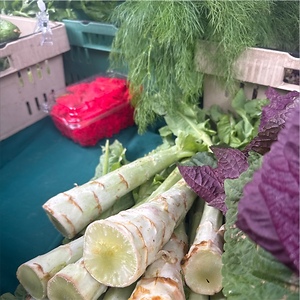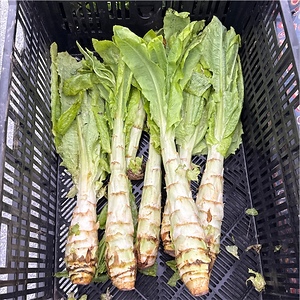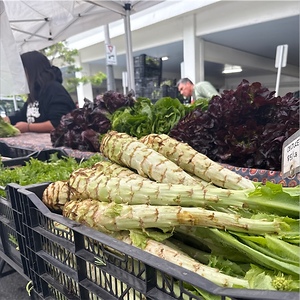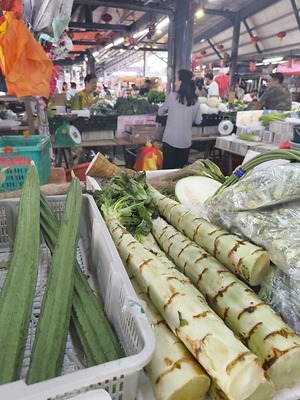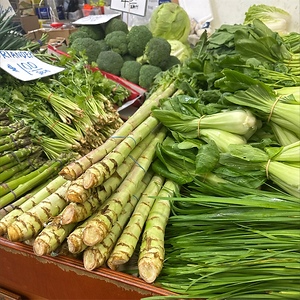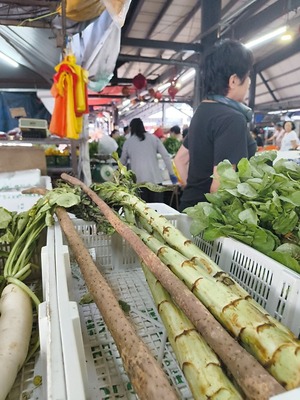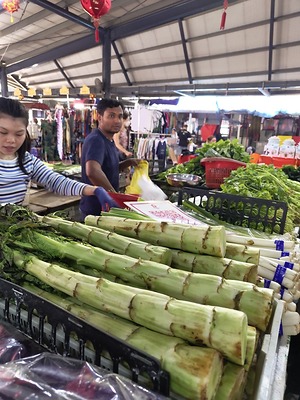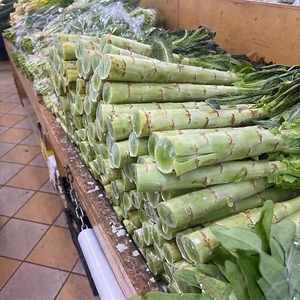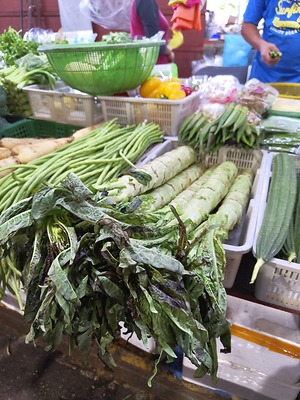

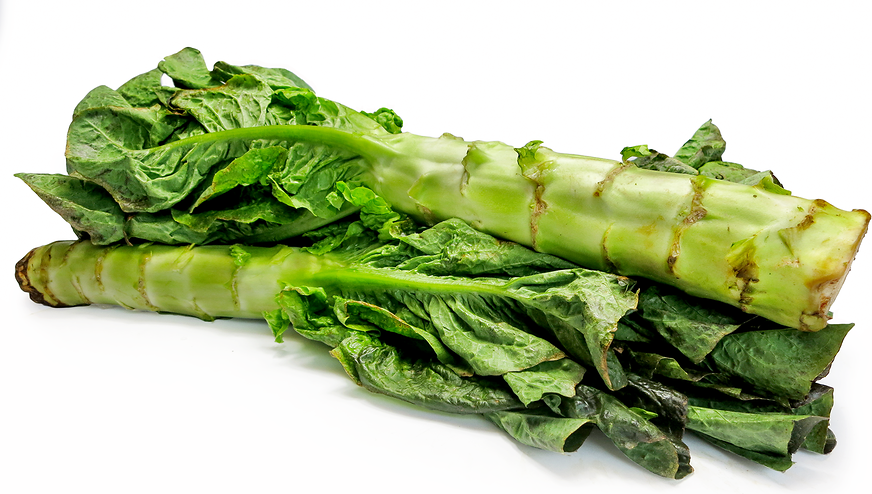
Asparagus Lettuce
Estimated Inventory, ea : 0
This item was last sold on : 10/08/22
Description/Taste
Asparagus lettuce is comprised of an upright, thick stem averaging 3 to 7 centimeters in diameter and 15 to 40 centimeters in length, topped with dark green, textured leaves. The stems are dense, fleshy, and enveloped in a fibrous, tough exterior skin. The skin must be peeled and discarded before use as it has a bitter, unpalatable flavor and texture. Asparagus lettuce typically has a matte appearance with green to yellow-green hues, sometimes flushed with purple or red accents, depending on the type. Underneath the exterior, the interior is firm, crunchy, and crisp with a succulent, tender, and aqueous consistency. The flesh is green to yellow-green and is juicy, giving it a glistening nature. The leaves at the top of the stem are pliable, wrinkled, veined, and showcase a prominent midrib. They also have an oblong to lanceolate shape, varying with specific kinds. Asparagus lettuce leaves and stems are edible raw or cooked. The leaves at the top of the stem have a mild, green, and vegetal flavor. Leaves at the base of the stem are mostly discarded as they can be tough and bitter. The stems have a refreshing, earthy, green, subtly nutty, lightly sweet, and slightly bitter taste.
Seasons/Availability
Asparagus lettuce is primarily available in the spring and fall, with some regions also having crops in the summer.
Current Facts
Asparagus lettuce, botanically classified as Lactuca sativa var augustana, is a type of non-heading lettuce belonging to the Asteraceae family. The plant is known for producing large, crisp, and fleshy stems and was bred specifically for this unique characteristic. Asparagus lettuce matures 60 to 70 days after planting and is a seasonal vegetable prized for its versatility. The stems and leaves can be consumed in various fresh and cooked culinary dishes, and retain a crunchy, succulent consistency, even after heating. In markets worldwide, Asparagus lettuce is well-known as Celtuce. The word celtuce is a portmanteau or blending of the terms celery and lettuce to describe the vegetable's texture and flavor. Asparagus lettuce is also known as Stem lettuce, Celery lettuce, Tender Stem lettuce, and Chinese lettuce in English-speaking regions worldwide. In Asia, it is a prevalent ingredient, called Yamakurage in Japanese, Gungchae, Ttungchae, and Julgi Sangchu in Korean, Qianjincai and Wosun in Chinese, Rau Tien Vua and Cải Tien Vua in Vietnamese, and Phak Kat Hom Tai Wan in Thai. It is important to note that there are many kinds of Asparagus lettuce grown worldwide that vary in leaf shape, leaf color, stem color, and flesh color. Most types are used interchangeably in dishes and are sought by chefs and home cooks for their mild, sweet, subtly nutty taste.
Nutritional Value
Asparagus lettuce is a fiber source to aid digestion and is listed in Traditional Chinese Medicine as an ingredient to remove heat and toxins from the body. Asparagus lettuce also acts as a natural diuretic and is believed to help lower blood pressure. Minerals, including potassium, manganese, iron, magnesium, calcium, and phosphorus, are found in the fleshy stems. Potassium aids the body in balancing fluid levels, while manganese contributes to energy production. Iron develops the protein hemoglobin for oxygen transport through the bloodstream, magnesium controls daily nerve functions, and calcium and phosphorus support bone and teeth health. Asparagus lettuce also contains vitamins A, B9, C, and E to maintain healthy organs, strengthen the immune system, and guard the cells against free radical damage.
Applications
Asparagus lettuce has a fresh, mild, vegetal, nutty, and subtly bitter taste suited for fresh and cooked preparations. The species has become a vegetable utilized worldwide and has an extensive history throughout Asia. Asparagus lettuce has historically been harvested and eaten raw as a snack in China. Several sources note that it was peeled, trimmed, and cut into small pieces, consumed with salt or sesame oil. Picking Asparagus lettuce straight from the earth is notably sweet and refreshing. After it is harvested, it begins to lose its sweetness over time. The stems purchased in markets have often been stored for a period, making them ideal for cooked preparations, as they have lost their sweetness. In Asia, Asparagus lettuce is primarily stir-fried, blanched for salads, simmered into soups, or pickled. Peeled and cut portions are tossed with garlic, vinegar, chili oil, and sugar in salads. Asparagus lettuce is also famously sliced diagonally and stir-fried with pork and aromatics. The species is known for retaining a crunchy texture, even after cooking or marinating, and can be served hot or cold. When pickled, the diced pieces are a favored topping for rice porridge, adding a sweet and salty taste. In China, Asparagus lettuce is added to noodle dishes and hot pot. The leaves of the stem are also separated and braised in flavorful broths. In Japan, Asparagus lettuce is notably sliced into thin strips and dried. These strips are called “Mountain Jellyfish” as they have a texture like dried jellyfish. The dried strips are pickled and served as a condiment, mixed into rice dishes, cooked with eggs, or mixed with mentaiko mayonnaise. Dried Asparagus lettuce is also used in soups throughout Vietnam, Thailand, and other parts of Southeast Asia. The strips are rehydrated and cooked as a noodle substitute. Outside of Asia, Asparagus lettuce is grilled, added fresh to salads, or cooked in gratins and stews. Asparagus lettuce pairs well with aromatics like chiles, spring onions, garlic, ginger, soy sauce, sesame oil, and Sichuan peppercorns, wood ear mushrooms, seafood, and meats including pork, poultry, and beef. The fleshy stems should be separated from the leaves and stored in a container in the refrigerator for 5 to 7 days. The stems can also be peeled and immersed in water in the fridge to retain a crisp texture.
Ethnic/Cultural Info
Dried Asparagus lettuce is called Gongcai in China, a name that allegedly stems back to the Qing Dynasty. Legend has it that residents of Guoyang County in the Anhui Province in China gave dried Asparagus lettuce as a tribute to the Qianlong Emperor, and the emperor was impressed by the vegetable’s crunchiness and refreshing taste. During this time, it was a great honor to give the emperor something new or an item he had not commonly encountered. The emperor immediately listed the vegetable as a new royal tribute after trying it for the first time, making Asparagus lettuce famous across China. Dried Asparagus lettuce is still known as Gongcai in the present day and is often seen as an auspicious ingredient for celebratory occasions.
Geography/History
Asparagus lettuce is a part of the Lactuca sativa species, which has origins in the Mediterranean and has been growing wild since ancient times. Early types of Lactuca sativa looked physically different from Asparagus lettuce and were introduced to China either during the Qing Dynasty or in the 5th century, a time of the Northern and Southern Dynasties. After its introduction, the species was selectively bred over time, creating new types of Lactuca sativa, including a plant with a larger, fleshier stem. Asparagus lettuce continued to be cultivated and improved in China, and the lettuce type became highly favored for its crunchiness and versatility. It was being widely produced across the country by the 12th century CE. Asparagus lettuce also spread in cultivation throughout Asia, eventually being introduced to parts of Europe and the United States in the mid to late 19th century. Several theories claim that Asparagus lettuce was carried to the United States through Chinese immigrants in the early 1800s and was mentioned by horticulturist John A. Kennicott. Asparagus lettuce was also listed in some seed catalogs, but the lettuce type never became widespread, leading it to disappear from marketing. Later in 1942, the Burpee Seed Company promoted Asparagus lettuce under the newly coined name Celtuce in their seed catalog. The catalog featured a multi-page, colored spread with text about how a reverend from Tibet sent the company seeds for the vegetable. Despite Burpee’s push to popularize the vegetable, Celtuce never became a common home garden crop in the United States. Today, Asparagus lettuce is commercially grown in Asia, with the highest production in China. It is also cultivated on a smaller scale worldwide and is sold through fresh markets, select retailers, and wholesalers.
Recipe Ideas
Recipes that include Asparagus Lettuce. One



